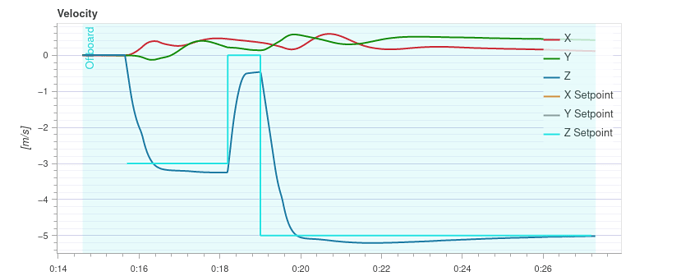Hello everyone,
I have a offboard code that gives about 50 setpoints to drone. It draws a spiral with that setpoints. My problem is I couldn’t get smooth travel. In every setpoint, drone gives a high roll or pitch instant and then floats to the next setpoint. Is there a way to have stable velocity while passing the setpoints? I mean I don’t want the drone to stop at each setpoint, I just want to pass on setpoints. Actually is there any other way to do spiral, like drawing a circle and then extending it or something else? If there is I would be very pleasant.
I have one more problem and this one is not so important. I just want to know if there is a short way to make vehicles heading in the moving direction. Mine just locks to certain yaw.
Thank you
Here is the code I have:
#include <px4_msgs/msg/offboard_control_mode.hpp>
#include <px4_msgs/msg/trajectory_setpoint.hpp>
#include <px4_msgs/msg/timesync.hpp>
#include <px4_msgs/msg/vehicle_command.hpp>
#include <px4_msgs/msg/vehicle_control_mode.hpp>
#include <px4_msgs/msg/vehicle_local_position.hpp>
#include <rclcpp/rclcpp.hpp>
#include <stdint.h>
#include <chrono>
#include <iostream>
#include "std_msgs/msg/string.hpp"
#include <math.h>
float X;
float Y;
using namespace std::chrono;
using namespace std::chrono_literals;
using namespace px4_msgs::msg;
class setpoint : public rclcpp::Node {
public:
setpoint() : Node("setpoint") {
offboard_control_mode_publisher_ =
this->create_publisher<OffboardControlMode>("fmu/offboard_control_mode/in", 10);
trajectory_setpoint_publisher_ =
this->create_publisher<TrajectorySetpoint>("fmu/trajectory_setpoint/in", 10);
vehicle_command_publisher_ =
this->create_publisher<VehicleCommand>("fmu/vehicle_command/in", 10);
// get common timestamp
timesync_sub_ =
this->create_subscription<px4_msgs::msg::Timesync>("fmu/timesync/out", 10,
[this](const px4_msgs::msg::Timesync::UniquePtr msg) {
timestamp_.store(msg->timestamp);
});
offboard_setpoint_counter_ = 0;
auto sendCommands = [this]() -> void {
if (offboard_setpoint_counter_ == 10) {
// Change to Offboard mode after 10 setpoints
this->publish_vehicle_command(VehicleCommand::VEHICLE_CMD_DO_SET_MODE, 1, 6);
// Arm the vehicle
this->arm();
}
//-------------
subscription_ = this->create_subscription<px4_msgs::msg::VehicleLocalPosition>(
"/fmu/vehicle_local_position/out",
#ifdef ROS_DEFAULT_API
10,
#endif
[this](const px4_msgs::msg::VehicleLocalPosition::UniquePtr msg) {
X = msg->x;
Y = msg->y;
std::cout << "\n\n\n\n\n\n\n\n\n\n";
std::cout << "RECEIVED VEHICLE GPS POSITION DATA" << std::endl;
std::cout << "==================================" << std::endl;
std::cout << "ts: " << msg->timestamp << std::endl;
//std::cout << "lat: " << msg->x << std::endl;
//std::cout << "lon: " << msg->y << std::endl;
std::cout << "lat: " << X << std::endl;
std::cout << "lon: " << Y << std::endl;
std::cout << "waypoint: " << waypoints[waypointIndex][0] << std::endl;
std::cout << "waypoint: " << waypoints[waypointIndex][1] << std::endl;
if((waypoints[waypointIndex][0] + 0.3 > X && waypoints[waypointIndex][0] - 0.3 < X)&&(waypoints[waypointIndex][1] + 0.3 > Y && waypoints[waypointIndex][1] - 0.3 < Y)){
waypointIndex++;
if (waypointIndex >= waypoints.size())
exit(0);
//waypointIndex = 0;
RCLCPP_INFO(this->get_logger(), "Next waypoint: %.2f %.2f %.2f", waypoints[waypointIndex][0], waypoints[waypointIndex][1], waypoints[waypointIndex][2]);
}
});
//--------------
// offboard_control_mode needs to be paired with trajectory_setpoint
publish_offboard_control_mode();
publish_trajectory_setpoint();
// stop the counter after reaching 11
if (offboard_setpoint_counter_ < 11) {
offboard_setpoint_counter_++;
}
};
/*
auto nextWaypoint = [this]() -> void {
waypointIndex++;
if (waypointIndex >= waypoints.size())
waypointIndex = 0;
RCLCPP_INFO(this->get_logger(), "Next waypoint: %.2f %.2f %.2f", waypoints[waypointIndex][0], waypoints[waypointIndex][1], waypoints[waypointIndex][2]);
};
*/
commandTimer = this->create_wall_timer(100ms, sendCommands);
//waypointTimer = this->create_wall_timer(2s, nextWaypoint); //EA
}
void arm() const;
void disarm() const;
void topic_callback() const;
private:
std::vector<std::vector<float>> waypoints = {
{2,0,-5,},
{2.35216,0.476806,-5,},
{2.57897,1.09037,-5,},
{2.64107,1.80686,-5,},
{2.50814,2.58248,-5,},
{2.16121,3.36588,-5,},
{1.59437,4.10097,-5,},
{0.815842,4.73016,-5,},
{-0.151838,5.19778,-5,},
{-1.27233,5.45355,-5,},
{-2.49688,5.45578,-5,},
{-3.76641,5.17438,-5,},
{-5.01428,4.59315,-5,},
{-6.1696,3.71161,-5,},
{-7.16089,2.54591,-5,},
{-7.91994,1.12896,-5,},
{-8.38568,-0.490343,-5,},
{-8.50782,-2.24876,-5,},
{-8.25018,-4.07119,-5,},
{-7.59329,-5.87384,-5,},
{-6.53644,-7.56803,-5,},
{-5.09871,-9.06439,-5,},
{-3.31919,-10.2773,-5,},
{-1.25611,-11.1293,-5,},
{1.01499,-11.5555,-5,},
{3.40395,-11.5071,-5,},
{5.8096,-10.9548,-5,},
{8.12407,-9.89139,-5,},
{10.2375,-8.33272,-5,},
{12.0431,-6.31859,-5,},
{13.4424,-3.91182,-5,},
{14.3502,-1.19649,-5,},
{14.6991,1.72493,-5,},
{14.4435,4.73543,-5,},
{13.5626,7.70817,-5,},
{12.0624,10.5118,-5,},
{9.97696,13.0162,-5,},
{7.36759,15.0983,-5,},
{4.32167,16.6482,-5,},
{0.949612,17.5744,-5,},
{-2.619,17.8084,-5,},
{-6.24045,17.3094,-5,},
{-9.76262,16.0665,-5,},
{-13.0314,14.1004,-5,},
{-15.8974,11.4644,-5,},
{-18.2226,8.24237,-5,},
{-19.8868,4.54696,-5,},
{-20.7936,0.515337,-5,},
{-20.8754,-3.69574,-5,},
{-20.0972,-7.91595,-5,},
{0,0,0}
}; // Land
int waypointIndex = 0;
rclcpp::TimerBase::SharedPtr commandTimer;
rclcpp::TimerBase::SharedPtr waypointTimer;
rclcpp::Publisher<OffboardControlMode>::SharedPtr offboard_control_mode_publisher_;
rclcpp::Publisher<TrajectorySetpoint>::SharedPtr trajectory_setpoint_publisher_;
rclcpp::Publisher<VehicleCommand>::SharedPtr vehicle_command_publisher_;
rclcpp::Subscription<px4_msgs::msg::Timesync>::SharedPtr timesync_sub_;
//
rclcpp::Subscription<px4_msgs::msg::VehicleLocalPosition>::SharedPtr subscription_;
//
std::atomic<uint64_t> timestamp_; //!< common synced timestamped
uint64_t offboard_setpoint_counter_; //!< counter for the number of setpoints sent
void publish_offboard_control_mode() const;
void publish_trajectory_setpoint() const;
void publish_vehicle_command(uint16_t command, float param1 = 0.0,
float param2 = 0.0) const;
};
void setpoint::arm() const {
publish_vehicle_command(VehicleCommand::VEHICLE_CMD_COMPONENT_ARM_DISARM, 1.0);
RCLCPP_INFO(this->get_logger(), "Arm command send");
}
void setpoint::disarm() const {
publish_vehicle_command(VehicleCommand::VEHICLE_CMD_COMPONENT_ARM_DISARM, 0.0);
RCLCPP_INFO(this->get_logger(), "Disarm command send");
}
void setpoint::publish_offboard_control_mode() const {
OffboardControlMode msg{};
msg.timestamp = timestamp_.load();
msg.position = true;
msg.velocity = false;
msg.acceleration = false;
msg.attitude = false;
msg.body_rate = false;
offboard_control_mode_publisher_->publish(msg);
}
void setpoint::publish_trajectory_setpoint() const {
TrajectorySetpoint msg{};
msg.timestamp = timestamp_.load();
msg.position = {waypoints[waypointIndex][0],waypoints[waypointIndex][1],waypoints[waypointIndex][2]};
msg.yaw = std::nanf("0"); //-3.14; // [-PI:PI]
trajectory_setpoint_publisher_->publish(msg);
}
void setpoint::publish_vehicle_command(uint16_t command, float param1,
float param2) const {
VehicleCommand msg{};
msg.timestamp = timestamp_.load();
msg.param1 = param1;
msg.param2 = param2;
msg.command = command;
msg.target_system = 1;
msg.target_component = 1;
msg.source_system = 1;
msg.source_component = 1;
msg.from_external = true;
vehicle_command_publisher_->publish(msg);
}
int main(int argc, char* argv[]) {
std::cout << "Starting setpoint node..." << std::endl;
setvbuf(stdout, NULL, _IONBF, BUFSIZ);
rclcpp::init(argc, argv);
rclcpp::spin(std::make_shared<setpoint>());
rclcpp::shutdown();
return 0;
}


